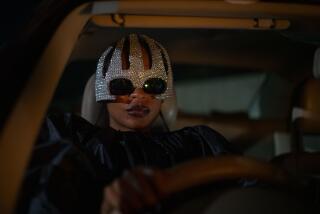Village Tradition From Contemporary African Filmmaker
- Share via
The Pan African Film Festival opens Thursday night with a dash of gentle Congolese/Belgian charisma, when Mweze Dieudonne Ngangura’s “Pieces d’identities” makes its Los Angeles debut.
Listed alternately by the festival as “Identity Pieces,” and “Tattered Identity,” the French-language film is a mix of genres: part comedy, drama, thriller, romance. It examines modern Europe through the eyes of a traditional African king, Mani Kongo (Gerard Essomba), who journeys from the Democratic Republic of Congo to Brussels in search of his daughter Mwana (Dominique Mesa), with whom he has lost contact.
At last month’s Nortel Palm Springs International Film Festival, where the film had its U.S. premiere, Ngangura, looking cosmopolitan in a smart leather jacket and salt-and-pepper goatee, seemed not unlike his lead character. “I am a modern African,” said Ngangura, who lives in Belgium. “But I still believe in my culture and my ancestors. So I am very interested in making popular African films.”
In the film, each of Mani Kongo’s encounters--from wacky to heartbreaking--brings its lesson. Primary among them: He may be a king in his village, but once he hits the city streets of Belgium he’s just a regular Joe.
“In his mind he has certain illusions about Belgium and western culture, so there are many adventures in the film that give him a different view and help him to realize that even tradition must evolve,” Ngangura said.
This stripping of his power weighs heavily on Mani Kongo. All but penniless in Brussels, he stays for a time in the African house--a sort of transitional hostel--until he is forced to hock his royal headdress and coronation necklace.
The film takes its title, “Pieces d’identities,” from these elaborately decorated vestments, which metaphorically carry the legacy of Mani Kongo’s domain.
“That is one of the aspects of Africa that I wanted to bring to light with the film: the coexistence of the two powers,” Ngangura said. “The old traditional system of kings [largely supplanted by colonization in the ‘60s] is still important to the people. Especially in the village. People in the villages believe the king has a kind of spiritual power. And even when they move to the city they still maintain a connection with their village of origin.
“In town, however, there are no kings. No kings in Kinshasa. There the republic has the real power because they have the army and they have the administration. So, often, when I show the film the audience reacts with surprise [that there are still kings in Africa]. ‘Oh! A king. A king!’ Yet it is one of the realities of Africa, even today.”
Ngangura took the name Mani Kongo from a popular Congolese king from the 16th century who first established a political relationship with Portuguese explorers. The headdress seen in the film is also authentic, borrowed from a gallery of African art in Brussels. The opening scenes, likewise, were shot in a real palace.
“We could not shoot in Congo because of the war. The insurance would not accept it. So we shot in Cameroon instead in a true palace,” Ngangura said. “There were things we could not touch in the house of the king. And a cleansing ceremony was performed before and after the shoot.”
War, according to Ngangura, has also been catastrophic to the film business in Congo. “Pieces d’identities” had its premiere there, but has not been shown since. “Since the war began the two existing distributors have left the country.”
“Identity Pieces” has fared better in other world markets, receiving awards at the Toronto International Film Festival and the Milan’s Festival Cinema Africano, as well as awards from children’s festivals in Germany and Namur.
Ngangura became interested in film while attending a Jesuit high school in east Congo. He won a scholarship to study film at Institut des Arts de Diffusion in Belgium and later returned to Congo to teach film from 1976-1985.
Ngangura co-directed his first feature, “La Vie est Belle,” in 1986. Ngangura followed with a number of short documentaries, including “Letters to Makura: The Last Brussels Tribe,” which examines the same African-Belgian community as “Pieces d’identities.”
“The issues in these films are both modern and traditional,” Ngangura said. “I make films both for kings and for many other people who are concerned with the problems of losing their cultural identities.”
* “Pieces d’identities” screens Thursday at 7:30 p.m. at the Magic Johnson Theaters, and repeats Feb. 15 at 2:30 p.m.
More to Read
Only good movies
Get the Indie Focus newsletter, Mark Olsen's weekly guide to the world of cinema.
You may occasionally receive promotional content from the Los Angeles Times.










